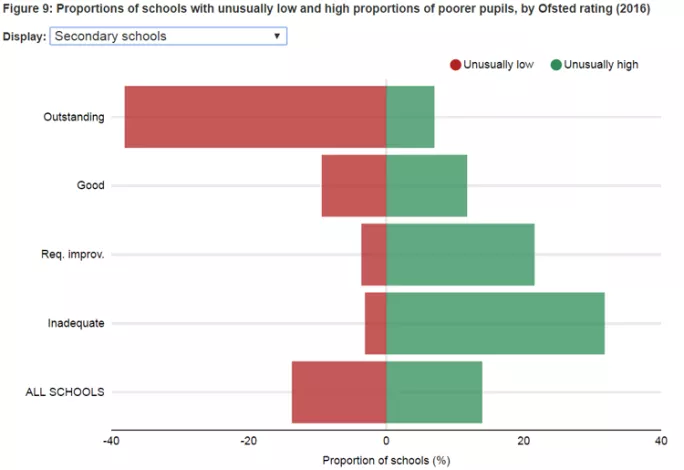A family living next to a school rated “inadequate” by Ofsted is more than 60 per cent more likely to be on a low income than one living next to an “outstanding” school, a new analysis finds.
New research shows that, on average, 15.5 per cent of families living in the postcodes of schools with the highest Ofsted rating are classified as on low incomes - but the comparable figure for schools with the lowest inspection rating is 25.3 per cent.
The analysis also finds that 38 per cent of outstanding secondaries take an “unusually low” proportion of poor children, compared with what would be expected of their local areas. Only 7 per cent take an “unusually high” proportion compared with their local area.
The analysis of IDACI deprivation data and free school meals figures by analysts SchoolDash also finds that local authority-run secondary schools are more likely to be representative of their local areas in terms of poverty than secondary academies.
The intakes of converter academies, the research found, were less likely to reflect local deprivation than those of sponsor-led academies, which were over representative of their area’s poverty levels.
The data shows a particular bias against poorer pupils in primary free schools, 23 per cent of which have unusually low levels of poorer pupils compared with what would be expected in their local areas.
Grammars ‘have unusually low intake’
It suggests that nearly half of non-Christian faith schools showed a bias towards children from richer families.
The data also shows that 99 per cent of grammars had an “unusually low” intake of poor pupils, compared with their local area.
The analysis comes as speculation is rife about a possible expansion of the grammar school system under Prime Minister Theresa May. A group of MPs recently called for a ban on new grammar schools to be lifted.
SchoolDash founder Timo Hannay, who carried out the research, said in a blog on the topic today: “Poor children seem to cluster in particular schools due to a combination of demographic and school selection effects - and if anything it is the latter that has the larger impact.
“The schools most available to them are sponsor-led academies or those with poor Ofsted ratings. When it comes to admitting poorer pupils, faith schools tend to be either neutral or negative.
“It is important to note that when we talk of school selection it doesn’t necessarily mean that anyone is deliberately conspiring to keep poorer children out.
“On the whole, it is more likely that these effects are unintended consequences of admissions policies that make sense in other ways. It is also possible that families presented with a choice of school are self-segregating along socio-economic lines, with working-class and middle-class families tending to make different choices.”
Dr Hannay added that the analysis had not included private schools, which, he said, “would presumably make even the most imbalanced groups of state schools look positively inclusive”.
But he argues that this does not mean “things ought to continue as they are”.
“If one of the main purposes of education is to act as a social leveller then on the basis of the evidence reviewed here it is failing in important ways,” he said.
“There are no easy answers to this unfortunate situation - any solutions are almost bound to be practically complicated and politically fraught. But until something changes it’s hard to see how poorer kids will get a fair chance when the schools that are most open to them are largely the kinds that no one else wants to attend.”
Want to keep up with the latest education news and opinion? Follow TES on Twitter and like TES on Facebook





